Graduates' thoughts on upper secondary school and studying, in spring 2025
In the spring of 2025, a total of 1,779 students graduated from upper secondary schools in Espoo – among them Iliana, Daniel, two students named Julius, Henri, Avin, Anna, Tapio, Eero, and Tomas. They share their thoughts on upper secondary school, studies, and the matriculation exams, as well as life lessons they've learned. They also offer advice and tips, drawn from experience, to those who are still in school or just about to begin.

Iliana Dulina graduates upper secondary school after two years of studying. Graduating early required focusing on studies and spending free time on them, too.
Otaniemen lukio upper secondary school specialising in mathematics and natural sciences. A lot of hard work goes into early graduation. ‘It feels nice to be graduating,’ Iliana says.
Iliana moved from Russia to Finland four years ago. In four years, she has learned to speak flawless Finnish without a hint of an accent. She even scored the highest grade in her matriculation examination in Finnish as a second language.
‘My parents urged me to go out and talk to Finns. At first I didn't dare. But when I did, I started making friends.’ Iliana is forever grateful to her preparatory education teacher, Hanna. Hanna noticed that Iliana and her brother were further along in their studies and offered them harder assignments and personal tutoring.
Focus on studying
Iliana has long been interested in mathematics and natural sciences. In addition to Otaniemen lukio, she had also considered applying for the mathematics programme at the Päivölä Institute after grade 9. Before starting at the upper secondary school and on weekends during upper secondary school, she went to the institute to study mathematics. No wonder that she scored a laudatur on her mathematics matriculation examination.
‘Other pupils in my comprehensive school didn't choose a specialisation in maths. However, in Otaniemi everyone else is also motivated and skilled. It affects your self-esteem,’ says Iliana. ‘But you shouldn’t compare yourself to others: the fact that someone is better at something, does not mean that they are better at everything,’ she adds.
When you graduate upper secondary school in two years, you don't really have time for other parts of life. Previously, Iliana loved to sailboard, although she has not found an opportunity to continue her hobby in Finland. Iliana says she studied every day, usually until ten in the evening. Fortunately, her family has a dog that she could take out for walks to get a break from studying.
Iliana thanks her student counsellor Emilia for her early graduation: ‘I wouldn't have graduated without Emilia. She helped me plan my courses and exam schedules,’ Iliana says.
She also praises all teachers in Otaniemen lukio: ‘I am grateful to all the teachers in my upper secondary school because everyone is always so excited about what they teach. It is fun to be in class.’
Happy memories from the second-year students’ dance
Due to her tight study schedule, Iliana did not have time to participate in events or projects during upper secondary school, even though there were plenty offered in Otaniemi – and Iliana praises their diversity. ‘Teachers encourage you to do many things. There are also courses in Otaniemi that have come from the teachers’ personal interests, which I admire. For example, there is a linguistics course and an astronomy course.’
Iliana’s best memories of upper secondary school are from the second-year students’ dance and the practices leading up to it. She remembers the hall of the ball in awe with its kilometres of fairy lights strung up to the ceiling. She is still reluctant to get rid of her dance gown, even though her mother has encouraged her to sell it.
Was I born too early or too late?
Iliana will continue to the University of Helsinki to study computer science. She is particularly interested in artificial intelligence. ‘I did my practical training at the University of Helsinki in lower secondary school and examined how artificial intelligence can solve programming contest tasks.’ However, the development of artificial intelligence is moving forward at a tremendous pace – it is pretty scary to wonder if it is already too late to hop into the bandwagon. ‘When I was little, I wished I would have been born later since, for example, an ordinary person still can’t travel to space. But maybe I was born too late after all...’ Iliana wonders. After the matriculation examinations, Iliana has taken some programming courses.
As a piece of advice for those who are now starting at the upper secondary school, Iliana says that it is better to try to make friends immediately as it can get more difficult as time goes on. When it comes to studying, her advice is clear: ‘It really is worth listening during the classes and doing a much more than required - it will help you later.’
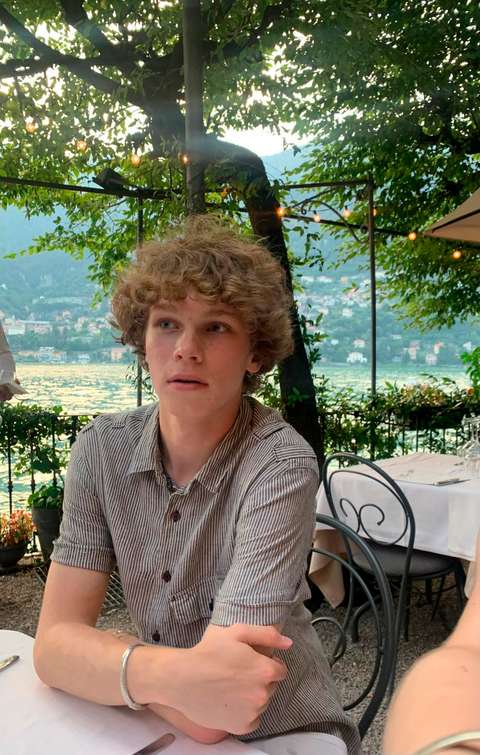
Daniel Jonsson is graduating from Mattlidens gymnasium upper secondary school. ‘It feels so great and like a big relief. Now I can relax,’ Daniel says.
Daniel also attended comprehensive school in Mattliden where the upper secondary school students are in the same building. In his opinion, teachers were the best part of the upper secondary school: ‘They challenge students just as much as they should, but they also create a relaxed atmosphere. Teachers help whenever you need it,’ Daniel says. He says that help is offered even if the student does not always know that they need it. The teachers lead students on the right path and together you try to find a solution. Students are not left alone with their problems.
Daniel's best memories of upper secondary school are the second-year students’ dance and the 'penkisdagen' - a pretty classic answer. Both were fun events and things that he had been looking forward to for a very long time. ‘In the second-year students’ dance, practising together strengthened our communal spirit,’ Daniel says. He has fond memories of the 'penkisdagen's lorry parade. ‘We rode a truck all around Espoo. People were happy, everyone was waving at us and shouting congratulations.’
Daniel learned from upper secondary school that you have to work consistently if you want to do well. ‘Although at the beginning I felt like this was not going to work, as long as you persist, you can do it,’ he says. He also learned that you should trust yourself - this takes you pretty far.
France is a great country
After the first year, Daniel spent a year as an exchange student in France. Daniel had not been learning advanced French but had started studying the language in the eighth grade. ‘I wanted new experiences and to learn something new,’ he says. He has always liked France a lot: ‘France is a wonderful, beautiful country with a rich culture.’
The exchange year was a great experience. In the beginning, Daniel had challenges because he didn't speak the language well but eventually things got better. The best memory of the year in France were the friends he got to know from around the world and who he still keeps in touch with.
The exchange year pushed Daniel’s studies in Finland back a year, so he is graduating a year later than the friends who started at the same time as him at Mattlidens gymnasium. ‘To be honest, it doesn't matter. It was worth it. I’m not in a rush at this age,’ says Daniel.
The future is still open and that's okay
Daniel’s future plans are still open: ‘It would be nice if I knew what to study or what I will be when I grow up, but I have no answer - or at least no clear plans for the future.’ Daniel has been offered a study place at Aalto University on the basis of his matriculation examination results, but he is not sure whether to accept it. However, he is tentatively interested in a Master’s degree of Science in Technology. But he could still change his mind. Maybe he will get a better idea about the future during his military service when he has time to think. Daniel is not worried.
For current upper secondary school students, Daniel wishes good luck for the matriculation examinations and urges them not to stress too much. ‘Grades do not define you as humans,’ Daniel emphasises.
For those starting upper secondary school, he advises to be open-minded and curious. Daniel also says to make choices according to your own interests: ‘Do what you like. Study the subjects that you are really interested in, it will always be better.’
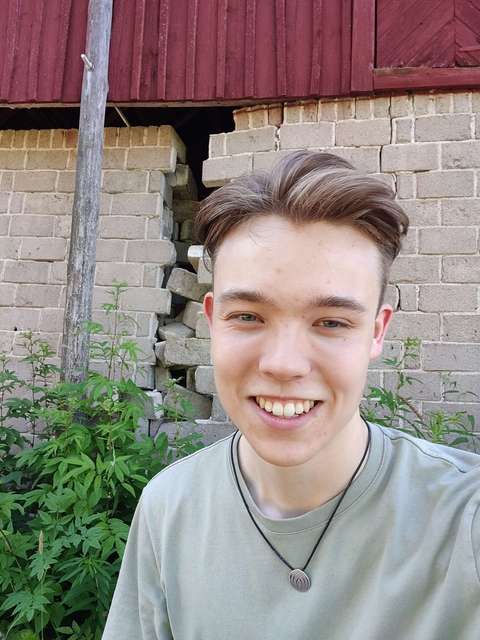
Julius Alanen is graduating from Etelä-Tapiolan lukio upper secondary school (Etis). Julius succeeded in his studies and was one of the driving forces behind the Nepal group in his upper secondary school.
Julius is graduating with the school’s best grade average and excellent results from the matriculation examinations – 5 laudaturs and one eximia. Julius also got one of the best scores in the psychology exam in Finland. ‘It feels a little sad to leave upper secondary school because so many fun things happened during these years. On the other hand, these three years have been very hard, so I am also relieved to ease the pressure,’ Julius sums up his thoughts.
Julius had good memories of his upper secondary school years. Field trips, in particular, were interesting and useful for Julius' own future study plans. Etis organised a visit to a company or educational institution every few months either in connection with a course or openly for anyone who wanted to attend.
‘My favourite ones were the visit of the Management and Interaction course to a lecture given by Fazer’s CFO at the company’s office and the visit of the Future Research course to the construction site at the Loviisa Housing Fair,’ Julius says. ‘The best thing about Etis was also that it offered these kinds of special courses which were developed by our teachers themselves,’ he adds.
During his years at the upper secondary school, Julius learned that it is worth trying to live life following your values, interests and future plans. To do that, you need to know yourself well. Julius says that during upper secondary school, he learned that it was not easy to distinguish between what parts of his identity were genuinely him and what had become a part of him as a result of the expectations of the surrounding people and culture. ‘However, when you learn to distinguish between these two parts, it is easier to make your own choices and not just conform to the expectations of the environment,’ Julius says.
Societal work
Julius was one of the driving forces behind the Nepal group in Etis. The Nepal group is a fundraising group operating in the upper secondary school that consists of volunteer students and three teachers. The school collects funds that currently sponsor approximately 40 casteless Nepalese students to attend upper secondary school. The Nepal project has been operating in Etis since 2006.
Julius was actively involved in the Nepal group for all three years of his upper secondary school studies. During this time, he baked and held fundraising cafés at the upper secondary school together with other students. The group also held individual fundraising campaigns, including helping out with catering for a wedding. ‘I joined the Nepal Group because I have always been interested in social issues and especially equality,’ Julius says. He had heard about Etis’ Nepal project even before starting at the upper secondary school, and it was one of the main reasons why he applied for Etis in grade nine.
The Nepal group also took an almost two-week trip to Nepal during Julius’ senior year. The participants included nine students and two teachers from the Nepal group. During the trip, the group met some of their sponsored students, toured the two largest cities in Nepal, and escaped the urban buzz to hikes in rural hills. ‘Some of my favourite parts of the trip were the welcoming Nepalese culture and magnificent landscapes!’ Julius says.
In addition to the Nepal project, Julius has volunteered for four years in young people’s Prometheus camps (so-called Protu camps.) On top of leading camps, he also acted as a trainer and as part of the hiking camp working group. ‘The best part of the Protu camps is that they are one of the few places where you get to discuss and think deeply with other people in an open-minded environment, without digital devices and other distractions,’ Julius explains.
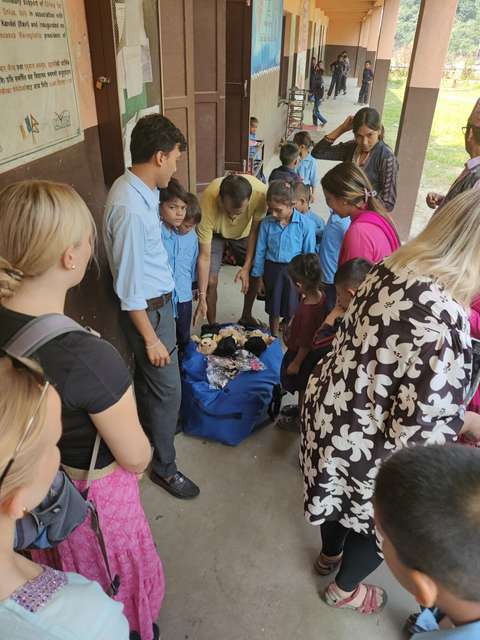
Making communities more human-focused
Julius applied to study applied psychology at the University of Helsinki - and was admitted! Before university, however, he will spend a year in the military. ‘In the future, I would be interested in developing the structures of communities and workplaces so that they would be more human-friendly. Contrary to what is often believed, the current spike in mental health issues is largely due to problematic structures and not, for example, the mental weakness of individual people,’ Julius says.
Julius’ advice for current and future upper secondary school students is to choose their subjects according to their own interests. Until the end of the second year of upper secondary school, Julius still studied physics and advanced Swedish, as these subjects award more than average points in certificate-based admissions in the university application process.
‘However, I always liked ethics and philosophy more, so at the end of the second year I decided to ditch physics and advanced Swedish in favour of these subjects,’ Julius says. By then, he had already completed almost all available courses in physics and Swedish. ‘In my senior year, I had to study the whole course load of two new subjects, but these subjects interested me much more. In the end, I got the highest grade in both ethics and philosophy in the matriculation exam, and I do not think I would have been able to do this with physics and Swedish that were less interesting to me.’
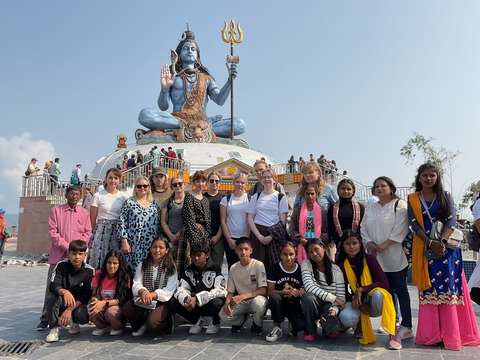
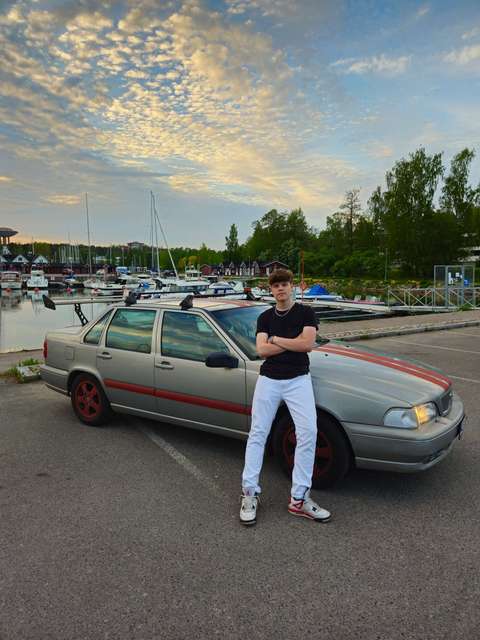
Julius Saarinen is graduating from Viherlaakson lukio upper secondary school. ‘It feels kind of strange to be graduating because the time at upper secondary school seemed to pass really quickly. At the same time, I am very pleased that I have done so well, but I guess I am going to miss it a bit,’ Julius says.
Julius says that the best thing about “Viheri” was a community where everyone got along very easily, and staff also put effort into spending time with students. ‘I can’t choose just one favourite memory from upper secondary school because there are so many. Well, maybe the best times were all my night drive adventures with friends.’
From hostel to bomb shelter
Speaking of cars... During his senior year, Julius drove to Ukraine with three of his friends. ‘We decided to go on a European road trip in the middle of the school week. At some point during planning, we got it in our heads that we also wanted to check out Ukraine,’ Julius says.
The foursome originally planned on visiting Lviv, but the destination soon changed to Kiev. Julius says they had no special reason to go there. The war was already going on at that time, and the trip would become an exciting story.
The trip to Ukraine took just over a couple of days, from which a bus trip from Warsaw was more than a day. ‘Getting into Ukraine wasn’t difficult in itself, but the trip took long due to planning, travel, and border checks. When we got on the bus that would take us to Kiev, our stress levels were rising, but soon we relaxed,’ Julius says.
The group of friends spent a day exploring Kiev. They visited some of the city’s best-known attractions, such as the Independence Square, which many know from TV, and the Motherland Monument. Julius and his friends spent the night in a hostel with a bomb shelter in the basement. ‘A couple of times we did have to go into the bomb shelter,’ Julius says. ‘The trip was very different from what I had thought, as the sirens no longer seemed to scare the locals,’ Julius adds. According to Julius, life in Kiev looked like ordinary everyday life, even with the war going on.
Some good advice
Julius learned more in upper secondary school than what he learned in class. ‘The most important personal lesson I learned in upper secondary school is that even though you may have many friends, the most important and close friendships really make life great. You don't need to have many of those.’
Julius’ future plans now include military service, where he intends to stay for 11 months. He is currently working as a security guard, and he is thinking of continuing to work in the private security sector for some time after the military service. ‘Eventually, I thought I might apply for work with the Prison and Probation Service of Finland,’ Julius says.
And finally, some important advice for current or new upper secondary school students: ‘Don’t be shy with talking to new people and getting to know them, as it is the easiest way to find a good friend group when you first start school.’ Julius’ group began to form exactly in this way, and more friends were added during the years at the upper secondary school.
Julius also encourages new students to participate in all possible events, such as the senior ball and cruises. ‘If you skip them, you might regret it later in life. And have fun outside of school, too!’

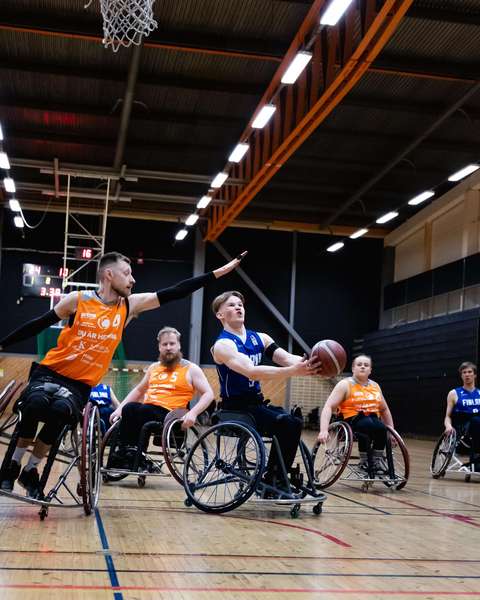
Henri Kössö is graduating from the sports programme at the Leppävaaran lukio upper secondary school. He plays wheelchair basketball and will participate in the European Championships in the C-series in the autumn with the Finnish team. In the future, sports and studies will go hand in hand on an American campus.
Henri applied for the Leppävaaran lukio upper secondary school because it offered a sports programme. ‘I found out in advance from the school’s sports coordinator, Heikki Saloranta, that as a para-athlete, I could exercise quite independently in a way that suits me because the school does not offer sports suitable for people with reduced mobility.’ Henri lives in Espoo, so getting to school was easy.
‘The best thing about Leppävaaran lukio is that it has competent and nice teachers and other people who support your studies,’ Henri says. His best memories from the upper secondary school include various end-of-semester celebrations and shared events.
Combining upper secondary school and sports is easy
Henri started playing wheelchair basketball at the age of 9, meaning that by now, he has been involved in the sport for almost 11 years. ‘The best thing about the sport is fast pace, action and team play,’ Henri explains.
It was easy to combine upper secondary school studies and sports in Leppävaaran lukio. ‘I didn’t make the decision to graduate upper secondary school in four years until my second year there, which allowed for plenty of time to train for the last two years of school. Sometimes it was hard during exam weeks when there was so much to read and many tests, and at the same time you had to train or play games, but I survived,’ Henri says.
Henri gives a special shout-out to the many sports and exercise facilities in Leppävaara Sports Park and in the Keran Hallit area, which is set to be demolished soon. ‘In addition, I made good use of the free timeslot my basketball club, Tapiolan Honka, offered at Honkahalli. I also was going to the para-athletics training at the Mäkelänrinteen lukio upper secondary school for a couple of years.’
Graduating feels good
Henri learned time management and calmness during upper secondary school years. ‘Things usually go better when you have planned in advance what to do and when. Then you can also feel relaxed and don’t have to panic that you haven’t managed to do anything,’ Henri says.
Graduating feels good to Henri – four years of work is finally over. Now Henri can take a breather before he has to “get back into the grind in a whole different environment.”
Next autumn, Henri will start studies at Southwest Minnesota State University (SMSU) in Minnesota, USA studying a Bachelor’s degree in computer science.
‘Studying is important for athletes because a sports career may come to a sudden stop, and it is a good idea to be prepared for a life after sports. In addition, studying is something different - a counterbalance to sport,’ Henri points out.
United States calls, of course for sports. This season, the Southwest Minnesota State University (SMSU) wheelchair basketball team was ranked third in the university series of 11 teams. Next season, a twelfth team will be added to the series. ‘The SMSU has been on the rise and my goal is to help the team move forward as well as possible. They are aiming for the championship of the series after many decades,’ Henri says.
Henri says that wheelchair basketball was developed in the United States and there are much more opportunities than, for example, in Finland (we have only 3 championship teams at the moment). ‘The opportunities for training are very good and the university supports athletes’ everyday life with all possible means.’
Aiming for a career in basketball
Henri's primary goal for the future is to be able to play wheelchair basketball professionally in places like Germany or Spain, but ‘before that, it would be nice to win the university series at least once in the US.’ In terms of studies, Henri plans to finish his Bachelor’s degree within four or five years and then consider whether he needs to continue to a Master’s degree or take a break from studies if an opportunity for a professional career opens up.
Henri has a couple of tips for current or future upper secondary school students: ‘Listen and participate in class. Enjoy your time at upper secondary school!’
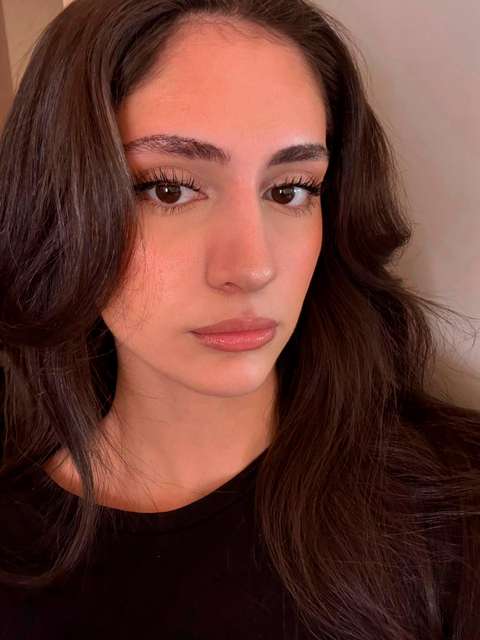
Avin Anwer is graduating from the Espoon yhteislyseo upper secondary school. Avin is excited about graduation. ‘I’m really happy and grateful about my upcoming graduation. I have worked hard in my upper secondary school studies. I am proud of myself and everything I have achieved,’ Avin says.
Avin got good grades in her matriculation examinations. Good grades required effort and learning from past mistakes. ‘I used and tried different studying methods. I utilised the lessons I learned from my first matriculation examinations and tried to avoid the same mistakes in future exams,’ Avin says. She also tried to find a balance between studying and other parts of life.
Upper secondary school is a significant period in a young person’s life and offers many good memories. Avin’s best memories are the time spent with friends and events organised by the upper secondary school, such as Christmas assemblies, culture day, the second-year students’ dance, and the “penkkarit” end-of-school celebration. ‘During these events, I had fun and I created a lot of memories.’ Avin also enjoyed being a tutor because it was a new and different experience.
She gives high praise to her school, Espoon yhteislyseo. ‘The teachers at EYL always do their best to help students as much as they can, they care about students, and they are always ready to help and provide support,’ says Avin, explaining that in addition to the actual classes, the upper secondary school organises workshops where students can get more support in their studies.
The school also cares about the well-being of its students. ‘They are continuously organising events where you can have fun and get a break from studying and stress,’ says Avin.
Study hard and have fun
During upper secondary school, a young person becomes an adult. There are more takeaways than what has been learned in class. Avin learned to know herself better and trust her abilities. ‘During upper secondary school, I got an opportunity to get to know myself better and find my own strengths. I also learned that in order to achieve something, it is important to believe in yourself,’ says Avin.
After upper secondary school, Avin intends to continue her studies, and she has applied for the University of Helsinki. ‘I intend to develop myself for the better also in life.’
Avin advises current students to be curious and try new things. ‘Come to events and have fun,’ Avin says. Avin also advises not to stress school stuff and grades too much - although it is still best to take care of studies and study hard. ‘It’s important to remember that this time ends at some point, so enjoy every moment and create many unforgettable mem
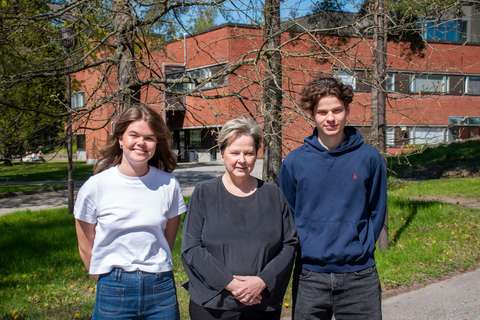
Anna Kalliola and Tapio Heikkola are graduating from Haukilahden lukio upper secondary school. They continue the tradition of Haukilahden lukio upper secondary school: acing their psychology exams.
Graduating concludes one stage of life. The feeling that graduating evokes is "pretty okay" and relaxed - there are no more obligations related to upper secondary school. However, ‘It does not seem like such a big deal to graduate from the upper secondary school because it is so common nowadays,’ Anna and Tapio say.
For many upper secondary school students, the best memories are from the senior ball or the end-of-year-costume party. However, for Anna and Tapio, the best times were the regular days at the upper secondary school. ‘I have good memories from the classes of nice teachers,’ Anna says. For Tapio, one of the best memories from general upper secondary school was also the seniors’ dinner that the seniors enjoyed in a restaurant with school staff.
The years at upper secondary school gave both a lot of knowledge but also personal lessons. ‘In upper secondary school, you learn to trust yourself, your thing, your priorities and the place you want to end up in,’ Anna says. Tapio says that he learned to look at the world through different eyes.
Going to class is fun - but success creates pressure
Haukilahden lukio could share many other success stories from the psychology matriculation examinations. In the spring, 27 of the students who graduated from Haukilahden lukio got the highest grade (87 of the graduates took the psychology exam).
The best grades from psychology exams in Haukilahden lukio have received national recognition: the Finnish Psychological Association and Suomen psykologian opettajien yhdistys (Finnish association of teachers of psychology) have jointly awarded prizes and scholarships to graduates who have received top scores in the matriculation examination in psychology since 1997.
Anna and Tapio received this recognition already in autumn 2024. They feel that a lot of this is thanks to the teacher. Without the teacher Pia Kuntanen, neither might have even studied psychology.
‘Pia has the ability to pick the essential points out of the topics that she teaches and she can teach how to respond in exams: what will be asked and how to give the answers,’ Tapio says. Pia herself says that sure, she can give advice on how to respond, but the student does the work themselves.
‘It’s nice to be in Pia’s classes, her teaching is fun and relaxed,’ Anna says. Pia’s classes are also famous in other upper secondary schools, and many want to take her refresher courses.
The near-legendary teacher of psychology herself says that she was motivated to become a teacher of psychology because she had a really good teacher at Porin lyseo upper secondary school. Pia has been teaching at Haukilahti lukio since 2001 and in Espoo since 1992.
‘Young people are the best. I sincerely like young people,’ Pia says.
The success of the upper secondary school in psychology exams also affected studies and created pressures. ‘I am competitive and I want to win,’ Tapio says. Pia reminds that sometimes you also fail. ‘In that case, I always feel bad for the student.’
Pia says that she feels nostalgic listening to the principal declare the students as graduated. ‘When a new group starts, I think how I could get to know these young people and wonder where to start. But when that group graduates, I always wish I could continue to work with that group forever.”
Different gap years
However, after upper secondary school, Anna and Tapio’s plans do not include studying psychology. Anna plans to take a year off after upper secondary school when she intends to work, have fun and travel, maybe somewhere in Asia. After her gap year, Anna wants to study engineering: ‘For engineering, a good grade in psychology does not even help you in certificate-based admissions.’
Tapio will spend his gap year in the military. After that, he wants to go to law school.
Tapio advises those just starting upper secondary school to avoid using their phones during classes: ‘When you are studying, put your phone away and concentrate. I’m a pretty normal young person so I am on social media and all that, but I use them in my free time.’ Anna agrees: ‘Tapio and I were some of the few who took notes by hand. It is worth taking your studies seriously from the beginning.’

Eero Häkkinen and Tomas Rajaniemi are graduating from Espoonlahden lukio upper secondary school “Jylla”. For both, the best memories of the upper secondary school years was meeting new people and gaining new experiences.
Graduating does not seem like a particularly big deal to Eero nor Tomas. ‘When I was little, I always thought graduating from upper secondary school would be something amazing. But now that we have been waiting for this for a couple of months after the exams, graduation feels kind of like it’s coming out of nowhere,’ Tomas says.
Espoonlahden lukio specialises in languages, which was the reason Eero and Tomas applied to study there. Before starting his studies, Eero was particularly interested in Chinese and Russian. However, it is the teens’ German skills that have received special attention. Both learned the language in an amazingly short time and received the second highest grade on it in the matriculation examination.
Tomas started studies in basic German in the first year of upper secondary school. After the first year, he was able to switch to advanced German classes because he had learned the language so well. Eero, on the other hand, had studied German in primary school, but had not been that interested in the language at that time, and only a few words had stuck to mind. ‘During senior year, Tomas got me into learning German. So, in one year, I learned it,’ Eero says.
Eero and Tomas both sport an impressive slew of languages: in addition to Finnish, Swedish, English and German, they also know Russian and Chinese. In addition, Tomas has learned French, Japanese and Italian. ‘I did take the French matriculation exam, but I don't feel that I know it properly,’ Tomas adds.
Immerse yourself in the language
Learning a language is easier if you surround yourself with it. ‘It is essential to be exposed to the language diversely. For example, you can passively listen to podcasts. I watched content online in German that I could have otherwise watched in English,’ says Eero. Tomas says that because he likes music, he listened to German music. Tomas has also participated in the school’s travel courses, allowing him to use the language in practice.
The upper secondary school has made Eero and Tomas independent and helped them grow up. ‘In the upper secondary school, I have matured to reflect on my own operating methods from a different perspective,’ Tomas says.
After upper secondary school, Eero will study Russian at the University of Helsinki. For Tomas, the future is still a little open, but language skills can at least open doors for studying or working abroad: ‘If I speak or work in another language, my thinking expands,’ Tomas sums up the positive aspects of language proficiency.
For current and future upper secondary school students, Eero and Tomas have some advice. Eero urges students to primarily study exactly what they are interested in. ‘Try different courses, everything that the upper secondary school offers,’ Tomas advises.